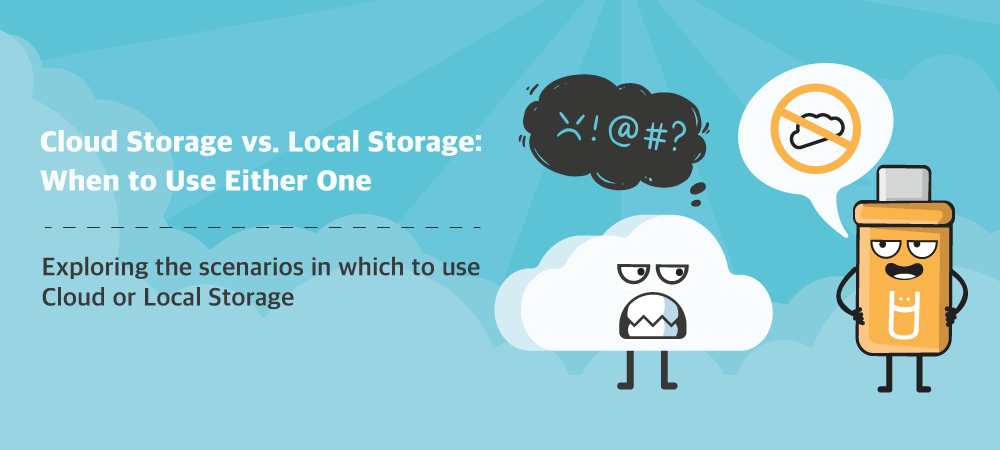
Cloud Storage vs. Local Storage: When to Use Either One
Most of us use both cloud storage and local storage on a daily basis. We use the cloud as we upload old photos to iCloud or send a coworker a bulky file through Google Docs. But we also use local storage as we load key files onto a USB flash drive for safekeeping or download a map to our phone so it's available offline.
It's clear from our everyday activities that both cloud and local storage have their place. So, what's the difference in cloud storage vs. local storage, and how do you know which is the best choice for your needs?

Cloud Storage vs. Local Storage: Defining the Difference
Here's the most basic definition of cloud vs. local storage:
- Cloud storage stores files on remote servers connected through the internet and owned by someone else.
- Local storage stores files on physical server equipment on your premises, either in flash memory or hard disk drives.
The difference is pretty simple, but also really important. It affects all kinds of things about the accessibility and security of your files. Both cloud and local storage can be good options -- but you need to know the pros and cons of each.
Want to learn more about these storage options? Our USB Memory Direct guides are here to help!
Cloud Storage: Pros and Cons
- Pros of Cloud Storage
- Files stored in the cloud are accessible and synchronized anywhere you have an internet connection. This can be clutch for remote collaboration in our new era of hybrid work.
- Many cloud storage providers offer a limited amount of free storage. Users who only need a small amount of storage for personal use often use a free account from a service like Google Drive.
- The user doesn't pay the upfront expense of server equipment and maintenance. Instead, the cloud storage provider purchases and maintains their own servers, which you pay to rent.
- Cloud storage is excellent for creating redundant backups. Most cloud storage solutions offer the option to automatically back up your system to the cloud, giving you many ways to preserve your data.
- Cons of Cloud Storage
- You're reliant on an internet connection to access your files. Anyone who might need to access files in situations without a data connection is out of luck, and even a slow connection can throw a wrench in your workday.
- The cloud storage provider controls security, which may not be up to the standards of industry best practices. Vetting your cloud storage provider helps, but the fact remains that cloud data breaches are frighteningly common.
- Free cloud storage accounts often aren't enough for a business's data storage needs. More robust enterprise cloud storage packages get pricey very quickly.
- You don't own the systems used to store your data, so the cloud provider ultimately controls your access. In the event of a dispute or other issue with the cloud provider, you could lose access to your data in a worst-case scenario.
Bring Your Custom Flash Drive Ideas to Life

Local Storage: Pros and Cons
- Pros of Local Storage
- You don't need an internet connection to access your files. So long as you have the storage device, local storage gives you reliable access whenever you need it. That's especially important because of the substantial broadband internet gap that limits coverage in many areas of the U.S.
- Local storage offers far more options for customization. You'll have the power to choose your own server equipment, storage devices, security solutions and more.
- Data transfer from local storage is faster. When data is stored on local devices, it eliminates the time required to access the cloud and the limitations of bandwidth.
- Local storage can be extremely cost-effective. Flash memory, in particular, has gotten so affordable that many organizations purchase bulk flash drives for their employees to use. Flash drive sizes are getting downright huge, and larger models can store a whole device's worth of files on one drive!
- Cons of Local Storage
- Customizing your own storage and security solutions comes with some responsibilities that not everyone will want to take on. Some, like encrypting USB drives, aren't as hard as they might seem, but these tasks do require time and resources.
- Collaboration processes may be less efficient if they rely solely on local storage. Remote workflows, in particular, may experience problems if there's not sufficient access to cloud platforms.
- Purchasing and maintaining heavy-duty local storage infrastructure requires more IT resources than cloud storage solutions do. Not every business will need a full-fledged local storage server, but businesses that do should be prepared for the costs.
Cloud vs. Local Storage: Which Should I Choose?
Choosing between cloud and local doesn't mean giving up one or the other! The two storage types complement each other and work together in all kinds of useful ways. In fact, most businesses today use some combination of the two.
For example, many businesses choose to have local backups of important data in addition to cloud storage. This reduces the chance of irrecoverable data loss while still allowing a business to capture the benefits of synchronized, cloud-based workflows. The best path forward doesn't require choosing a side -- it's much more about integrating the best of both worlds!
Browse Bulk USB Flash Drives for Every Need

Want to make your local storage solutions more cost-effective and portable, with the option to add a little pizzazz? You're speaking our language! Contact USB Memory Direct to see our industry leading prices and our amazing variety of custom flash drives.